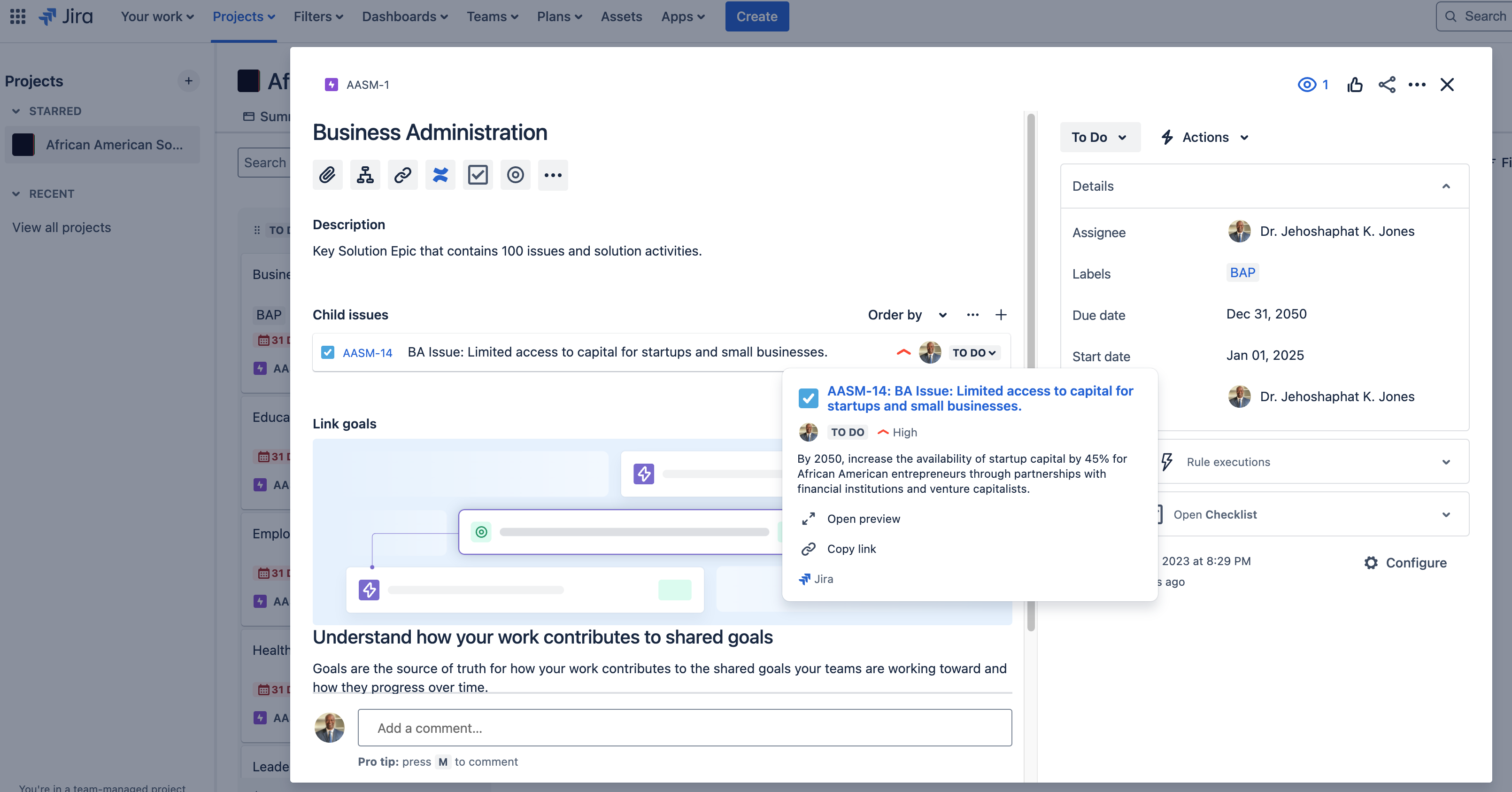NEXUS 2050
Documenting the top 1000 issues and goals affecting the African American community is crucial for strategic planning, effective intervention, and essential for driving meaningful change. The ten focus areas of the African American Solutions Matrix: The List include business administration, education, employment and careers, health and wellness, leadership and mentorship, legal reform, politics, technology, and wealth management. Each focus area contains the top 100 issues and goals in which stakeholders will report progress until remediation and resolution is achieved.
Applied Research Institute’s comprehensive approach ensures that focus areas are addressed systematically, fostering progress, tracking, and collaboration among stakeholders. By identifying and setting SMART (Specific, Measurable, Achievable, Relevant, Time-bound) goals across various focus areas, we can create targeted strategies to overcome challenges and leverage opportunities within the African American community for sustainable progress and development.
Ten Focus Areas
Business Administration
- Economic Empowerment: Strengthens local economies through increased business ownership and economic activity.
- Entrepreneurship Development: Encourages innovation and the creation of new business ventures, generating job opportunities.
- Financial Independence: Promotes personal and community wealth accumulation and financial literacy.
- Access to Capital: Facilitates access to funding and resources necessary for business growth and sustainability.
- Economic Equity: Reduces disparities in business success rates and economic stability among African Americans.
Careers and Jobs
- Employment Opportunities: Creates and improves job prospects, reducing unemployment and underemployment rates.
- Career Advancement: Provides pathways for professional development, promotions, and career growth.
- Income Equality: Addresses wage gaps and ensures fair compensation for work performed.
- Job Readiness: Enhances skills and training programs to better prepare individuals for the job market.
- Economic Mobility: Improves opportunities for upward mobility and financial stability within the community.
Education
- Academic Achievement: Enhances educational outcomes, leading to higher graduation rates and academic success.
- Equity in Access: Ensures all students, regardless of background, have access to quality education and resources.
- Future Opportunities: Prepares students for higher education and professional careers, improving life prospects.
- Community Development: Contributes to the overall development and upliftment of communities through education.
- Skill Building: Equips students with essential skills and knowledge needed for personal and professional growth.
Health and Wellness
- Healthcare Access: Ensures equitable access to medical care and essential health services.
- Disease Prevention: Focuses on reducing the prevalence of chronic diseases and improving overall health outcomes.
- Mental Health Support: Provides resources and support for mental health issues, promoting emotional well-being.
- Health Education: Increases awareness and knowledge about healthy lifestyles and preventive care.
- Community Health: Strengthens community health programs and services to address specific health needs and disparities.
Leadership and Mentorship
- Representation: Increases African American representation in leadership positions across various sectors.
- Skill Development: Offers training and development programs to build leadership skills and capabilities.
- Mentorship Programs: Facilitates mentorship relationships to guide and support emerging leaders.
- Community Impact: Strengthens leadership within the community to drive positive change and advocacy.
- Network Expansion: Expands professional networks and connections for individuals in leadership roles.
Legal Reform
- Justice System Fairness: Promotes fairness and equity in legal proceedings and sentencing.
- Legal Representation: Ensures access to adequate legal representation for individuals facing legal challenges.
- Criminal Justice Reform: Addresses systemic biases and works towards more just and equitable criminal justice practices.
- Policy Changes: Advocates for changes in laws and policies that impact the African American community.
- Legal Education: Provides education and resources on legal rights and processes to empower individuals.
Networking and Relationship Management
- Professional Connections: Builds valuable professional relationships and connections that can advance careers.
- Resource Access: Enhances access to resources, opportunities, and support networks.
- Community Building: Strengthens community ties and fosters collaboration and mutual support.
- Career Development: Facilitates career growth and development through networking opportunities and relationship management.
- Strategic Partnerships: Creates and nurtures strategic partnerships that benefit individuals and organizations.
Politics
- Political Representation: Ensures fair and equitable representation of African Americans in political offices and decision-making bodies.
- Voter Rights: Protects and advocates for the rights of African Americans to vote and participate in the political process.
- Civic Engagement: Encourages active participation in political and civic activities to influence policy and decision-making.
- Policy Advocacy: Supports policies and legislation that address issues and improve conditions for the African American community.
- Political Education: Provides resources and education on political processes, rights, and responsibilities.
Technology
- Digital Equity: Addresses the digital divide, ensuring equal access to technology and digital resources.
- Tech Industry Inclusion: Promotes diversity and inclusion within the technology sector and related fields.
- Innovation and Growth: Encourages technological innovation and the adoption of new technologies.
- Digital Literacy: Provides training and resources to enhance digital skills and proficiency.
- Access to Opportunities: Improves access to technology-related career opportunities and educational resources.
Wealth Management
- Financial Literacy: Enhances understanding of financial management, investment, and personal finance.
- Wealth Accumulation: Facilitates opportunities for building and sustaining personal and generational wealth.
- Investment Access: Improves access to investment opportunities and financial resources.
- Economic Stability: Contributes to long-term financial security and stability for individuals and families.
- Financial Planning: Provides tools and strategies for effective financial planning and management.

